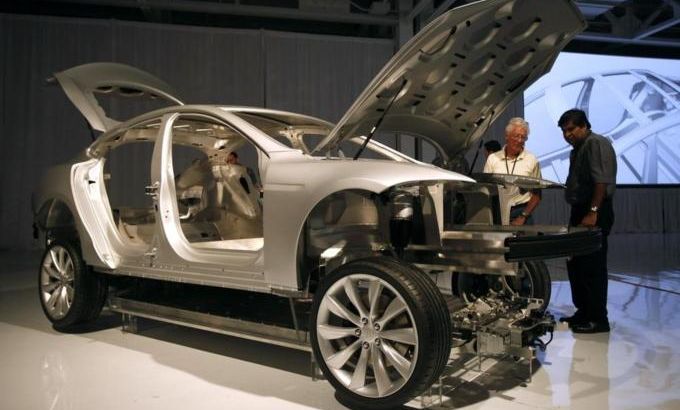
Driving towards a greener future?
As electric car wins coveted award, we ask if the industry has turned a corner and how this will impact the environment.
A plug-in electric car develped by a start-up company in the United States is leaving its conventional rivals behind.
The Tesla Model S has been named Car of the Year by Motor Trends magazine, in one of the auto industry’s most prestigious, closely watched awards.
Keep reading
list of 4 itemsCould shipping containers be the answer to Ghana’s housing crisis?
Are Chinese electric vehicles taking over the world?
First pig kidney in a human: Is this the future of transplants?
It is the first time a battery-powered vehicle has scooped the coveted accolade.
But questions remain as to whether electric cars can provide a realistic and commercial alternative to conventional vehicles, and whether they really are that green.
Electric cars emit no exhaust fumes, so there is less pollution. The batteries that power them are more efficient and require less maintenance. And since electricity costs less than petrol, they are cheaper to run.
|
“They have turned a corner because what they have done is make electric cars cool. And that is something that, so far, makers have been unable to do …. That’s important in changing people’s perception of the electric car. What it’s not going to do is have people buying electric cars in droves. It is still very much a niche car.“ – Nick Gibbs, Automotive News |
Electricty can also be produced using renewable energy sources – from the sun and wind for instance.
However, critics argue that the electric car model does not add up if the electricity is generated by coal-fired power stations.
A study in Norway also said the toxicity of the manufacturing process had a greater potential for damaging the environment.
There are also other disadvantages, such as the range and ease of recharging an electric car, which could be a worry for long-distance drivers.
Electric cars have also tended to be more expensive, although the prices are coming down.
Governments have been accused of failing to encourage the development of alternative sources of power for cars – because they benefit from the tax on fuel.
Last year, for instance, the British government earned $1.30 for every litre of fuel sold to consumers at the pumps, which amounts to almost 60 per cent in tax.
Germany raked in more than half of the price of a litre of fuel in tax. And the rate in Japan was just less than 40 per cent.
|
“Electric veicles are only as green as the electricity that’s used to power them. So if we are producing our electricity from coal, from gas, then no they are not a massive step forward really. The challenge for us is to ensure that we get our electricity from clean sources, the wind, the waves, the sun, the tides, and in that case electric vehicles are a really important part of going green for the future.“ – Paul Steedman, Friends of the Earth |
Globally, road transport is responsible for around 16 per cent of man-made CO2 emissions, according to the International Organization of Motor Vehicle Manufacturers.
And sales of conventionally powered vehicles have been motoring ahead over the past decade.
In 2000, there were a total of 41 million cars manufactured globally. Ten years later, that figure surged to 60 million.
In contrast, there were an estimated 40,000 electric and plug-in hybrid vehicles sold in 2011. But global leaders want that number to rise to 20 million by 2020.
So, what effect is this having on the environment? And could the car of the future be green?
To discuss this, Inside Story, with presenter Ghida Fakhry, is joined by guests: Paul Steedman, a senior campaigner for Friends of the Earth and a specialist in climate change and energy; and Nick Gibbs, a car enthusiast, and a UK correspondent for Automotive News, Europe.
ELECTRIC CARS:
- Last year around 60 million cars were produced worldwide
- Global car production could reach 100 million units a year by 2016
- Around 691 million passenger cars were on the roads last year
- China wants to put five million hybrid and electric cars on its roads by 2020
- Companies like Toyota, Honda and Ford all produce electric or hybrid cars
- Electric cars are more energy efficient than petrol powered cars
- Critics say electric cars are more environmentally damaging to produce